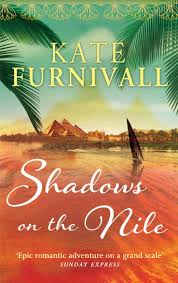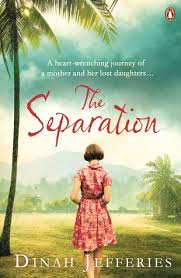 Kate Furnivall’s Shadow on the Nile is a rip-roaring adventure full of the dry dust of Egypt. From the beginning, we are drawn into Jessie’s world as she searches for her missing brothers – the one who was taken as a child, and the one who is missing in Egypt. Her determination to follow the ‘Sherlock Holmes’ type clues, make her an engaging and resourceful character. Everything you’d want from this sort of novel is here – the quest for antiquities, old tombs, and the danger caused by greed and political instability. There is romance, and kidnapping, and ruthless villains. But this is not just a romp. What elevates it and makes this novel special is the portrayal of Georgie, from whose point of view we begin to understand how mental health was viewed in the 1930’s, and what happened to people who, like Georgie, were seen as dangerously different.
Kate Furnivall’s Shadow on the Nile is a rip-roaring adventure full of the dry dust of Egypt. From the beginning, we are drawn into Jessie’s world as she searches for her missing brothers – the one who was taken as a child, and the one who is missing in Egypt. Her determination to follow the ‘Sherlock Holmes’ type clues, make her an engaging and resourceful character. Everything you’d want from this sort of novel is here – the quest for antiquities, old tombs, and the danger caused by greed and political instability. There is romance, and kidnapping, and ruthless villains. But this is not just a romp. What elevates it and makes this novel special is the portrayal of Georgie, from whose point of view we begin to understand how mental health was viewed in the 1930’s, and what happened to people who, like Georgie, were seen as dangerously different.
Kate Furnivall does a great job of conjuring Georgie’s world and its limitations, and of making us understand his choices, which from an outside view may make no sense, but from the point of view of someone autistic are perfectly logical. ( I must point out that the term is never used in the book, except in the author’s notes.) Read this if you like exotic settings and unusual viewpoint characters – Georgie is a wholly believable protagonist, and I thought his narration was masterfully done.
Another nove l set in an interesting location, but this time in the 1950’s in Malaya – The Separation by Dinah Jefferies.
l set in an interesting location, but this time in the 1950’s in Malaya – The Separation by Dinah Jefferies.
Lydia’s husband disappears, taking with him their two children. Having been told they have travelled further north, she sets off to search for her children.
What she doesn’t know is that Emma and Fleur have been taken to England and told by her husband she has abandoned them.
Lydia’s journey takes her through a landscape of violence and terror which she barely survives. The Malayan jungle is brought blisteringly to life, with its heat, dangerous insects and snakes, its mosquitos and monkeys. Meanwhile, in England, Emma struggles to come to terms with her mother’s unexplained absence, her father’s coldness, and the fact that she has to be sent away to a school for ‘bad’ children. Family secrets abound, and these are skilfully revealed like a drip-feed.
What I loved about this novel was the contrasting settings – Emma’s cold, damp, dreary school, run by dour nuns, versus the colour, passion and heat of Malaya. And yes, there is a romance here too in this steamy setting. This is a real page-turner. The fact that the reader is always one step ahead of the separated parties makes for gripping reading, and means that the reader is always anxiously anticipating the effect of the new revelation on the separated children. This is dual narrative done really well, with both stories equally compelling.
Those who like dual nasrrative novels set in the 20th century, with great atmosphere and unusual settings with love these two books – both highly recommended.
